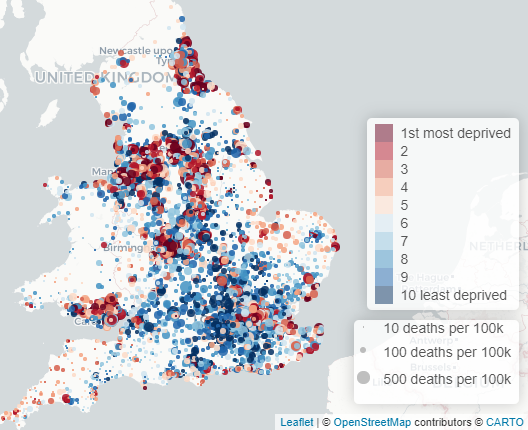
- Covid-19 is impacting those communities already struggling, with people in the most deprived areas more likely to be out of work and have worsening mental health conditions. Covid-19 mortality rates are also higher in more deprived neighbourhoods.
- Data finds that while North of England is the region with the highest number of people living in the most deprived neighbourhoods, other regions combined have just as big a challenge with deprivation
The government has been urged to define what it means by ‘levelling up’ as new data suggests that solely focusing policy and funding on broad geographic areas will not create a ‘ladder of opportunity’ for people living in some of the most deprived communities in the UK.
The Commission, which was set up in July this year, and is chaired by John Allan CBE, the chair of Tesco and Barratt Homes, has published its initial analysis looking at how the Covid-19 pandemic has impacted individuals, neighbourhoods and communities right across the UK.
Key findings produced by WPI Economics for the Covid Recovery Commission, include:
- The most deprived neighbourhoods are found in every part of the UK. The North West has the greatest number of people- 1.6million – living in the 10 per cent most deprived neighbourhoods in the UK, closely followed by Yorkshire and The Humber (1.1million). However, more than half of people living in the 10% most deprived neighbourhoods are found outside the North of England (36% in the rest of England, 15% in Scotland, Wales or Northern Ireland).
- Some of the highest levels of deprivation are found in some of the wealthiest areas of the country. 18% of people in the most deprived neighbourhoods – 1.15 million people – in the UK are living in local authorities with the highest economic output.
- Mortality rates from Covid-19 are highest in the most deprived neighbourhoods in the UK. Even after controlling for a range of other factors, in the 20% most deprived neighbourhoods there has been an average of 21 more Covid-19 deaths per 100,000 population compared to the least deprived neighbourhoods.
- Unemployment benefit claims have risen most in those areas that were already suffering from high rates of claims. Those neighbourhoods in the highest 10% of unemployment benefit claims prior to Covid-19 have seen a 5.4 percentage point increase in claims, compared to a 2.3 percentage point increase for those in the 10% with the lowest claim rate prior to Covid-19
- The impact of Covid-19 on mental health has been most apparent amongst the least well off. The proportion of people experiencing moderate to severe symptoms of depression has increased by 14 percentage points for those who say they cannot afford an unexpected expense, compared to 8 for those who can afford one. More than a third of people (35%) who say that they cannot afford an unexpected expense now report moderate to severe symptoms of depression.
The report argues that the government should establish an agreed set of metrics to measure levelling up which include non-economic measures such as physical and mental health. In line with our findings that areas of deprivation can be found within otherwise prosperous areas, these measures should be reported at the neighbourhood level.
It says that the Government should use the Devolution White Paper to give more powers and funding to Metro Mayors to deliver against these metrics, as well as asking them to report on them locally, driving local accountability for actions.
The Covid Recovery Commission will publish a series of major recommendations at the start of next year, including how business of all sizes can play a greater role in working with government and civil society to create the conditions for the UK to emerge from the pandemic as a stronger, fairer and more resilient economy.

John Allan, Tesco
John Allan, Chair of the Covid Recovery Commission, said:
“Inequality has been a perennial challenge that governments of all colours have attempted to address. As this research demonstrates, Covid-19 has unfortunately had the greatest impact on the most deprived communities in the UK.
The government’s broad focus on levelling up the country should be applauded. However, without a clear definition and set of metrics to assess progress, it is difficult to see how we can provide a ladder of opportunity for people living in some of the most deprived communities.
Just as important is to hold people accountable at a local level to ensure measures and funding lead to results.”

Helen Barnard, Joseph Rowntree Foundation
Helen Barnard, Director, Joseph Rowntree Foundation and a member of the advisory group said:
“It’s not right that both the health and economic impacts of this pandemic have fallen most heavily on the people who were already struggling to stay afloat, and the local economies which were already lagging behind. Levelling up is now more crucial than ever, and it needs to offer a reliable route out of poverty for families all over the UK.
The response must match high quality jobs with targeted skills and employment support for those most exposed to the coming wave of unemployment. The Commission is right to call on the government to define exactly what levelling up means, put freeing people from poverty at its heart and devolve funding and power to Mayors and local government to deliver for their communities and protect the hardest hit.”

Matt Leach, Local Trust
Matt Leach, CEO of Local Trust and member of the Covid Recovery Commission Advisory Group added:
“The last six months of crisis have further exacerbated existing differences in access to opportunity and resources both regionally, but also at a neighbourhood level – something well evidenced by this report. As we rebuild after COVID, we need to ensure levelling up is not limited to rebalancing regional economies and renewing town centre infrastructure. We also need to commit to invest in supporting the development strong and sustainable social infrastructure at a neighbourhood level, ensuring no communities are left behind.”
ENDS
Notes to Editors
Data relating to people living in deprived neighbourhoods across the UK.
| Number of people | |
| Wales | 300,000 |
| East Midlands | 400,000 |
| East of England | 200,000 |
| London | 200,000 |
| North East | 500,000 |
| North West | 1,600,000 |
| Northern Ireland | 200,000 |
| Scotland | 500,000 |
| South East | 300,000 |
| South West | 300,000 |
| West Midlands | 1,000,000 |
| Yorkshire and The Humber | 1,100,000 |
| Total | 6,500,000 |
| Non-North-England | 2,400,000 |
| Devolveds | 1,000,000 |
| North England | 3,200,000 |
Sources: Indices of Multiple Deprivation 2019, MHCLG; Welsh Index of Multiple Deprivation 2019; Northern Ireland Multiple Deprivation Measure 2017, NISRA; Scottish index of multiple deprivation 2020, Scottish Gov’t; Mid-year population estimates 2018, ONS, NRS, and NISRA.
Methodology: Neighbourhoods (LSOAs, Datazones, and Small Areas) were categorised as being in the lowest decile of their country’s respective Index of Multiple deprivation, and their total resident populations were calculated within each region/country.
